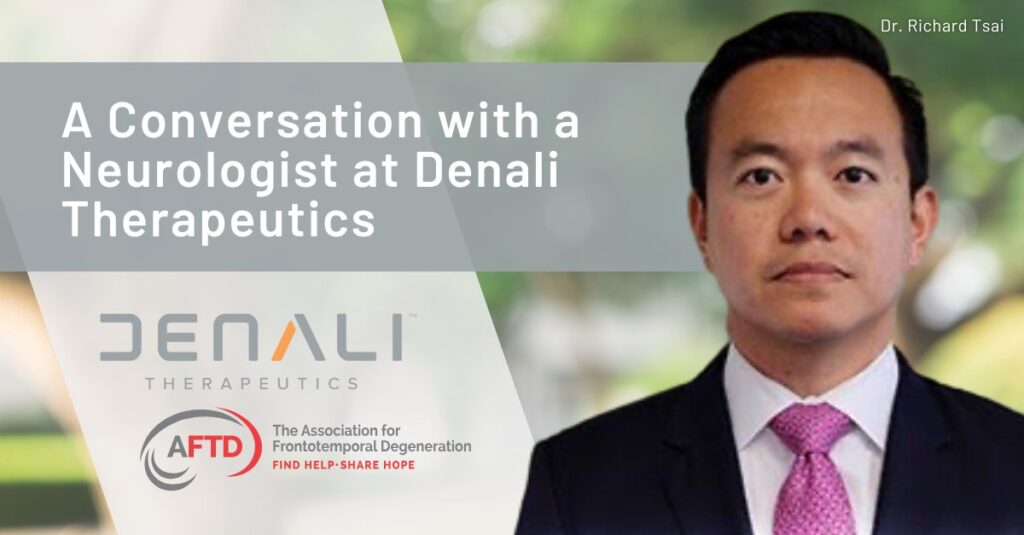Ein Gespräch mit einem Neurologen bei Denali Therapeutics

Kürzlich unterhielt sich AFTD mit Mitgliedern des Denali Therapeutics-Teams, darunter Dr. Richard Tsai, um Einblicke in ihre Arbeit an der Entwicklung eines Therapeutikums mit Takeda zur Behandlung von FTD-GRN (frontotemporale Demenz verursacht durch GRÜN Genmutationen). Dr. Tsai ist Neurologe am Denali-Krankenhaus, wo er zusammen mit anderen Wissenschaftlern klinische Studien zu Prüfmedikamenten entwirft und durchführt. Zuvor war er Assistenzprofessor für Neurologie und stellvertretender Leiter des Programms für klinische Studien zu Alzheimer und frontotemporaler Demenz am UCSF Memory and Aging Center.
-
Welchen Ansatz verfolgt Ihr Unternehmen zur Behandlung von FTD?
Denali Therapeutics widmet sich der Weiterentwicklung von Behandlungen, die auf die zugrunde liegenden Ursachen der frontotemporalen Demenz (FTD) abzielen, die mit Granulin (GRÜN) Genmutationen. GRÜN Mutationen führen zu einem Verlust von bis zu der Hälfte der normalen Menge an Progranulinprotein (PGRN) im Körper. Wir entwickeln eine PGRN-Ersatztherapie (TAK-594/DNL593), die darauf ausgelegt ist, den PGRN-Spiegel im Gehirn durch intravenöse Injektionen wiederherzustellen. Die Hoffnung besteht darin, dass diese experimentelle Therapie die Verschlimmerung der Krankheit verlangsamen oder stoppen wird.
-
Was ist Ihrer Meinung nach das dringendste Problem für Menschen mit FTD und ihre Familien?
Für Familien, die von FTD betroffen sind, sind Unterstützung und Aufklärung weiterhin von entscheidender Bedeutung. Während eine gut verträgliche, krankheitsmodifizierende Therapie zur Verlangsamung oder Aufhebung der Krankheitsverschlechterung oberste Priorität hat, besteht auch ein dringender Bedarf, das Bewusstsein für FTD zu schärfen. Mehr Aufklärung kann den Zugang zu einer schnelleren Diagnose und einer entsprechend unterstützenden Umgebung für die Patienten und ihre Familie unterstützen. In einem Artikel aus dem Jahr 2017 haben Galvin und Kollegen gezeigt, dass diese verheerende Krankheit eine größere finanzielle Belastung verursacht als andere neurodegenerative Erkrankungen wie die Alzheimer-Krankheit. Bei Denali erkennen wir den dringenden Bedarf an gut verträglichen, wirksamen, krankheitsmodifizierenden Therapien und wir sind entschlossen, diesen Bedarf durch unsere Forschung, unsere Partnerschaften (z. B. mit Takeda) und unsere Zusammenarbeit mit der FTD-Gemeinschaft zu decken, um Hoffnung und sinnvolle Fortschritte zu bringen.
AFTD-Hinweis: Mit Unterstützung von AFTD hat ein Forscherteam unter der Leitung von Dr. James Galvin eine Studie zur wirtschaftlichen Belastung durchgeführt, in der die jährlichen Kosten für die Pflege einer Person mit FTD analysiert wurden, einschließlich des Einkommensverlusts im Zusammenhang mit FTD-Symptomen oder einer Diagnose. Das Dokument des Teams finden Sie hier: hier.
-
Welche Rolle hoffen Sie, dass Sie und Ihre Kollegen bei der Stärkung dieser Community spielen?
Wir sehen uns sowohl als Wissenschaftler als auch als Verbündete im Kampf gegen FTD. Unsere Aufgabe ist es, potenziell bahnbrechende Therapien so schnell und verantwortungsvoll wie möglich in klinische Studien zu bringen und sie letztlich den Patienten zugänglich zu machen. Wir hoffen, eine Führungsrolle zu übernehmen und/oder auf eine Weise zusammenzuarbeiten, die andere biopharmazeutische Unternehmen wie Takeda, gemeinnützige Organisationen und Gesundheitsbehörden einbezieht, da die Bekämpfung dieser Krankheit eine Teamleistung erfordert. Wir sind uns auch bewusst, wie wichtig es ist, transparent zu sein und der Gemeinschaft zuzuhören. Wir schätzen die Partnerschaft mit der AFTD sehr und sind bestrebt, einen offenen Dialog mit der FTD-Gemeinschaft zu führen, Updates auszutauschen und Feedback zu sammeln, um sicherzustellen, dass unsere klinischen Studien und anderen Programme den Bedürfnissen der Patienten/Familien entsprechen. Empowerment bedeutet für uns, Patienten und Familien Hoffnung zu geben und sie mit den erzielten wissenschaftlichen Fortschritten zu verbinden.
-
Wie können wir uns Ihrer Meinung nach gegenseitig bestärken, unsere gemeinsamen Ziele zu erreichen?
Empowerment entsteht durch offene Kommunikation und eine gemeinsame Vision. Indem wir eng mit Patientenvertretungen zusammenarbeiten, Wissen teilen und die Gemeinschaft in unsere Forschungsarbeit einbeziehen, schaffen wir ein starkes Netzwerk der Unterstützung und Zusammenarbeit.
-
Was finden Sie an der heutigen Forschungslandschaft am ermutigendsten?
Als ich vor gerade einmal 10 Jahren als Kliniker mit Patienten mit FTD zu arbeiten begann, hätte ich nicht gedacht, dass es so schnell so viele Möglichkeiten für experimentelle Medikamente geben würde. Das Tempo des wissenschaftlichen Fortschritts und der Innovation in der Forschung zu neurodegenerativen Erkrankungen ist unglaublich ermutigend. Wir sehen auch eine zunehmende Zusammenarbeit zwischen Biotechnologie, Wissenschaft und Patientenvertretungen, was bei einer seltenen Krankheit wie FTD sehr wichtig ist. Diese gemeinsame Anstrengung bedeutet, dass aus Hoffnung greifbarer Fortschritt wird und wir näher denn je daran sind, Krankheiten wie FTD wirklich zu beeinflussen.
-
Welche Herausforderungen sehen Sie und welche Hoffnungen haben Sie, wie die Beteiligten diese gemeinsam bewältigen können?
Eine der größten Herausforderungen ist die Komplexität und Seltenheit von FTD selbst. FTD ist eine vielschichtige Krankheit, die maßgeschneiderte Ansätze für verschiedene Patientengruppen erfordert. Das Bewusstsein, dass FTD keine einzelne Krankheit ist, sondern eine Gruppe verwandter Krankheiten mit mehr als einer möglichen Ursache, kann die Bevölkerung dazu ermutigen, mehr medizinische Hilfe zu suchen, die zu einer besseren Diagnose, Unterstützung und Kenntnis klinischer Studien führen kann. Darüber hinaus kann der Zugang zu klinischen Studien, insbesondere bei seltenen Erkrankungen wie FTD, für viele Familien schwierig sein. Bei vielen Studien dauert es länger als geplant, bis die Teilnehmerzahl erreicht ist, und sie liefern im Gegenzug Antworten auf wichtige wissenschaftliche Fragen. Wir glauben, dass wir diese Hürden überwinden können, indem wir – Biotechnologieunternehmen, akademische Forscher, Gesundheitsdienstleister und Patientenvertretungen – zusammenarbeiten.
AFTD-Hinweis: Unabhängig davon, ob Sie eine persönliche oder familiäre Vorgeschichte von FTD haben oder ob frühere Fehldiagnosen möglicherweise eine solche verschleiern könnten, empfiehlt AFTD dringend, dass Sie eine genetische Beratung als ersten Schritt zur Beantwortung von Fragen zu Ihrem genetischen Status in Betracht ziehen.
Ein genetischer Berater kann die Wahrscheinlichkeit beurteilen, dass Ihre Erkrankung oder die Erkrankung Ihrer Familie eine genetische Ursache hat, und kann Ihnen helfen, die Einzelheiten genetischer Tests zu durchdenken und mit Familienmitgliedern über den Testprozess, Datenschutzbedenken und mehr zu sprechen. Mit Personen, die an Tests interessiert sind, bespricht der Berater die Risiken und Vorteile und identifiziert den spezifischen Test, der die genauesten Ergebnisse gewährleistet. Weitere Informationen zur genetischen Beratung finden Sie hier hier.
AFTD schätzt die anhaltende Unterstützung unserer Mission und der Menschen, die wir betreuen, durch Denali Therapeutics und Takeda Pharmaceuticals aufrichtig.
Nach Kategorie
Unsere Newsletter
Bleib informiert
Melden Sie sich jetzt an und bleiben Sie mit unserem Newsletter, Veranstaltungsbenachrichtigungen und mehr auf dem Laufenden …
